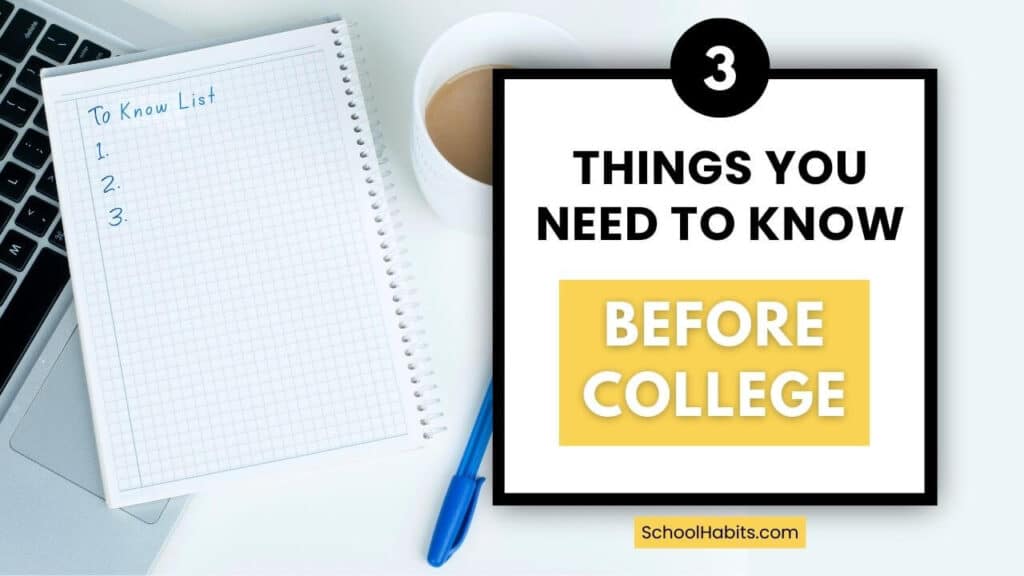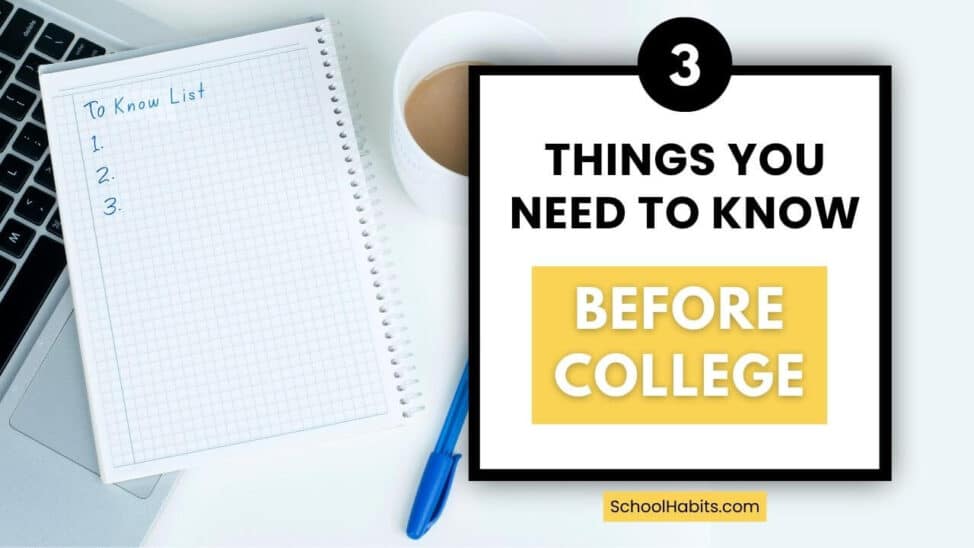By Katie Azevedo, M.Ed.

Being a college student is so different from being a high school student.
Don’t get me wrong: High school certainly has challenges. But in most cases, high school students get a lot of support from teachers and parents to manage those challenges. In college, however, many of those supports are gone.
Whether you live on campus or you commute to college, so much more of your academic experience is in your hands compared to when you were in high school.
In this blog post, you’ll learn three important things you need to know before going to college. It’s an extension of another post called The 4 Most Important Skills You Need In College.
This post is intended for high school students headed to college. But if you’re already in college, keep reading because you might be missing something from this list below that could make your life easier.
1. You Need Legitimate Study Skills in College
There’s no way around this one. You have to know how to study to do well in college. Obviously you studied in high school, but studying for assessments looks a lot different in college.
High school teachers usually provide study guides before tests and often spend class time reviewing as a group. In college, this rarely happens and you need to know how to make your own study guides and study on your own.
SchoolHabits.com is full of tutorials about how to study. Below are some of my most popular study tutorials:
- How to Use Active Recall
- How to Study with Spaced Repetition
- How to Study Using Interleaved Practice
- How to study with the Feynman Technique
I already mentioned this but it’s worth saying again: In addition to the above study methods, you also need to know how to make your own study guide. This is how to make your own study guide.
Another difference between high school studying and college studying is the mindset you need to have.
College exams are intense and cover a lot of material, and they’re not something that you can wing at the last minute.
Many high school students manage to scrape by with studying at the last minute, but that mindset will not work in college.
The amount of material you’ll need to know for college tests simply requires more time to learn. That’s just how the learning process works. The mindset shift you’ll need to make from high school to college is accepting that studying and learning take a certain amount of time, regardless of how we feel about it.
As I explain in the podcast episode linked below, there’s a whole bunch of neurological and chemical things that have to happen in the background for us to actually learn something, and there’s nothing that we can do to make this process happen faster just because we want it to. The sooner you accept that, the quicker you can move on to worrying about things that you do have control over, like doing the actual studying.
2. Your Time Management System and Strategies Must be Foolproof in College
One of the biggest differences you’ll notice between high school and college is what your actual days look like.
No longer will all your classes be back to back in one chunk of time. In college, your schedule is much more scattered. You might only have classes a few days a week, you may have just one or two classes a day with several hours in between, or all your classes could be in the morning and you’re done by 11 AM. My point is that college schedules are fragmented.
PS: Many college students have trouble managing their no-class days. (Yes, it’s possible that you’ll have one or two days a week where you have NO classes.) Here are 5 ways you definitely want to use those weekly no-class days wisely.
For many students, the college schedule is much better than the high school schedule. And you might find that you like it better as well, but the key is knowing how to manage those giant chunks of free time without accidentally letting them go to waste.
Time management is an important college skill that can have an impact on your grades and even your mental health.
When I talk about time management, sometimes I see eyes roll, as students have been hearing about the importance of time management for years. But many of my students who roll their eyes at the words “time management” are the ones with no time management skills at all.
If your natural response to reading this is a subtle eye roll, then I challenge you to be honest about where your time management skills are and be open to some of the suggestions below. (Also, if you’re totally new to the concept of time management, read my tutorial called “What is Time Management Really? A Student’s Guide to Understanding Time.“)
The first step to managing time in college is to make time visible. I say this all the time because we can’t manage what we can’t see.
How do you make time visible in college? With calendars.
If you’re not using some kind of calendar to keep track of your days and your time, then you’re wasting time. And maybe now is a good time to remind you that time is the one thing that you’ll never get back, so yeah, it’s kind of valuable.
Here is my Google Calendar tutorial for students. I suggest you start there. When you’re done with that, use these 6 time management strategies.
If you’re already using some kind of calendar, then the next step would be to think about time blocking.
Time blocking is an excellent time management tool that you can use on your busiest days to guarantee that you are doing the right things and have enough time to get them done.
Something else you’ll have to think about in college that maybe you didn’t think about too much in high school is managing your time on the weekend.
Academic demands in college are so much greater, and it’s nearly inevitable that at least some of your weekend will be spent doing homework and studying.
In this tutorial, I show you exactly how to use your time on the weekends in a way that still leaves you with free time to do whatever the heck you want.
3. If You’re Going to Survive College, You Need to Know How to Communicate
Communication is another one that sometimes gets me eye rolls.
If you’re rolling your eyes, then maybe it just hasn’t fully been explained before? Not sure what the reason is. But I’m hoping that I can do “communication” justice in the following section of this post.
In high school, you obviously had to communicate with others, but most of that communication was social. So I mean texting, conversations in hallways, messaging on social media… things like that.
But in college, communication goes up a level.
College classes are scattered across campus in different buildings, which means you need to find different ways to connect to and communicate with your peers about school-related things (study groups, help, etc).
College also requires a lot of email communication between you and teachers or teaching assistants (TAs). That means you need to know how to write appropriate emails to professors. My blog post How to Write an Email to a Teacher has been the number one most-read post on my entire website for a few years now.
You also need some communication skills that involve negotiating awkward social situations in the dorm, like how to tell your roommate that you’re not really into their habit of falling asleep to heavy metal music without headphones. Or their hockey equipment is making the room smell like rotten eggs. Or you’d like them to stop breaking into your private snack stash that you keep under your bed. Silly or not, you need good communication skills to have these conversations:
Below are some foundational communication tips for college:
- Be clear
- Be concise
- Be respectful
- Be solution oriented
- Listen as much as you talk
- Compromise
- Never assume the other person knows what you’re thinking or feeling
- It’s better to overcommunicate than to under-communicate
- Be careful with your tone (in writing and in person)
Final Notes About Going to College
There’s a lot you need to know before going to college. The three categories I included in this blog post are some of the most important ones. Other things that are helpful to know are these basic student life skills. Aaaaand I highly recommend that all college students have these 11 study essentials for their dorm room.
And then you know what? The rest you’ll figure out as you go. College is meant to be new and adventurous and even uncomfortable at times. But this is what makes it amazing.

